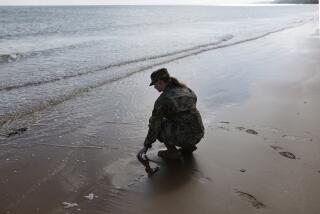Irish Search Souls Over Uprising Anniversary : Rebellion: Freedom fighters of 1916 are glorified. But some say violence is nothing to celebrate.
- Share via
DUBLIN, Ireland — As so often happens in Irish pubs, the talk had turned to politics.
“The lads of the Rising o’ 1916, they were soldiers. They fought for a cause, for Irish freedom,” one flush-faced patron said.
“Och, true enough, Seamus,” said his elderly friend. “But honestly now, we ought to know in this day and age that shootin’ and killin’ isn’t the work of heroes. ’16 was different. They was all romantic, ready to throw down their lives for Ireland. Things aren’t that simple anymore. Never were.”
“Sometimes Davey,” his friend replied, “I’d swear you’d’ o’ wished the Brits had stayed.”
Such are the divided realities of Dublin today, 75 years after the city was plunged by republican revolutionaries into a bloody rebellion against British rule.
On Easter Monday, 1916, about 1,500 haphazardly armed men and teen-agers seized key buildings and declared a provisional government committed to “the right of the people of Ireland to the ownership of Ireland.” They held out for six days against British troops before surrendering, with more than 400 dead and much of Dublin in ruins.
Most citizens of the Irish Republic have traditionally recalled the “blood sacrifice” of the “Men of 1916” with affection, as a threshold event on the route toward eventual political independence. But today, on the eve of its 75th anniversary, two decades of death and destruction in neighboring Northern Ireland have injected an unprecedented level of national soul-searching into the Rising remembrance.
Some citizens have gone so far as to suggest, in the words of one letter-writer, “We have nothing to celebrate.”
“A lot of people would run away from the words ‘republican’ now because it has been contaminated and hijacked by a small minority in Northern Ireland who see violence as the way to achieve political objectives,” said Jim Mitchell, a member of the Irish Parliament and a former justice minister.
Mitchell, a member of the opposition party Fine Gael, has called for the Rising to be marked this year by a national referendum asking whether citizens oppose the use of violence to achieve a united Ireland--a vote, in effect, on the Provisional IRA. And a party leader, John Bruton, has proposed that any Easter observance should honor the rebels--and the 45,000 Irish who died fighting in British armed forces in World War I.
Ireland’s main ruling party, Fianna Fail, has always been considered the most “green” since its formation by Eamon de Valera, the only surviving commander of the Easter rebels.
Yet the current Fianna Fail prime minister, Charles J. Haughey, whose father was an Irish Republican Army commander, has sought to downplay the coming anniversary. Committed to European integration and to increased cooperation with former British foes, Haughey had reportedly favored no state Rising ceremony.
But under pressure from republican elements in his party and in Northern Ireland, he has allowed a brief military ceremony Sunday at Dublin’s bullet-marked General Post Office, which served as the 1916 rebels’ headquarters.
Predictably, the middle-of-the-road gesture pleased few and angered many. “The Easter Rising is something which causes great offense throughout Northern Ireland,” said John Taylor, an Official Unionist member of Parliament in Northern Ireland. His party represents most Northern Protestants, who are committed to remaining part of Britain.
“It does not help the prospect for talks between north and south that the present government in Dublin should involve itself in such a way with the Rising. . . . People on both sides of the border will not be able to make the distinct difference which exists between the old IRA and the Provisional IRA.”
Indeed, many here would argue that the old rebels fought as a stand-up army--the “gallant band with guns in hand” of republican folk songs--whereas the modern campaigners have used booby-trapped bombs, community intimidation and other decidedly unromantic means of warfare.
But others, from staunch republicans to respected academics, maintain that the activists of ’16 and ’91 are motivated by the same beliefs and goals--hence the feeling that, by cheering the Rising, they are endorsing the continuation of the Northern Ireland conflict.
Robert Ballagh is an Irish artist heading the 75th Anniversary Committee, which has planned events next week emphasizing the Rising as it is reflected in Irish song, poetry and art. He said the Irish “should have the confidence to celebrate our history instead of being riddled with guilt and doubt about it.”
“This should be like in America,” he said. “When you celebrate the Fourth of July, you’re not celebrating the killing of British troops. You’re simply celebrating your national independence.”
More to Read
Sign up for Essential California
The most important California stories and recommendations in your inbox every morning.
You may occasionally receive promotional content from the Los Angeles Times.













